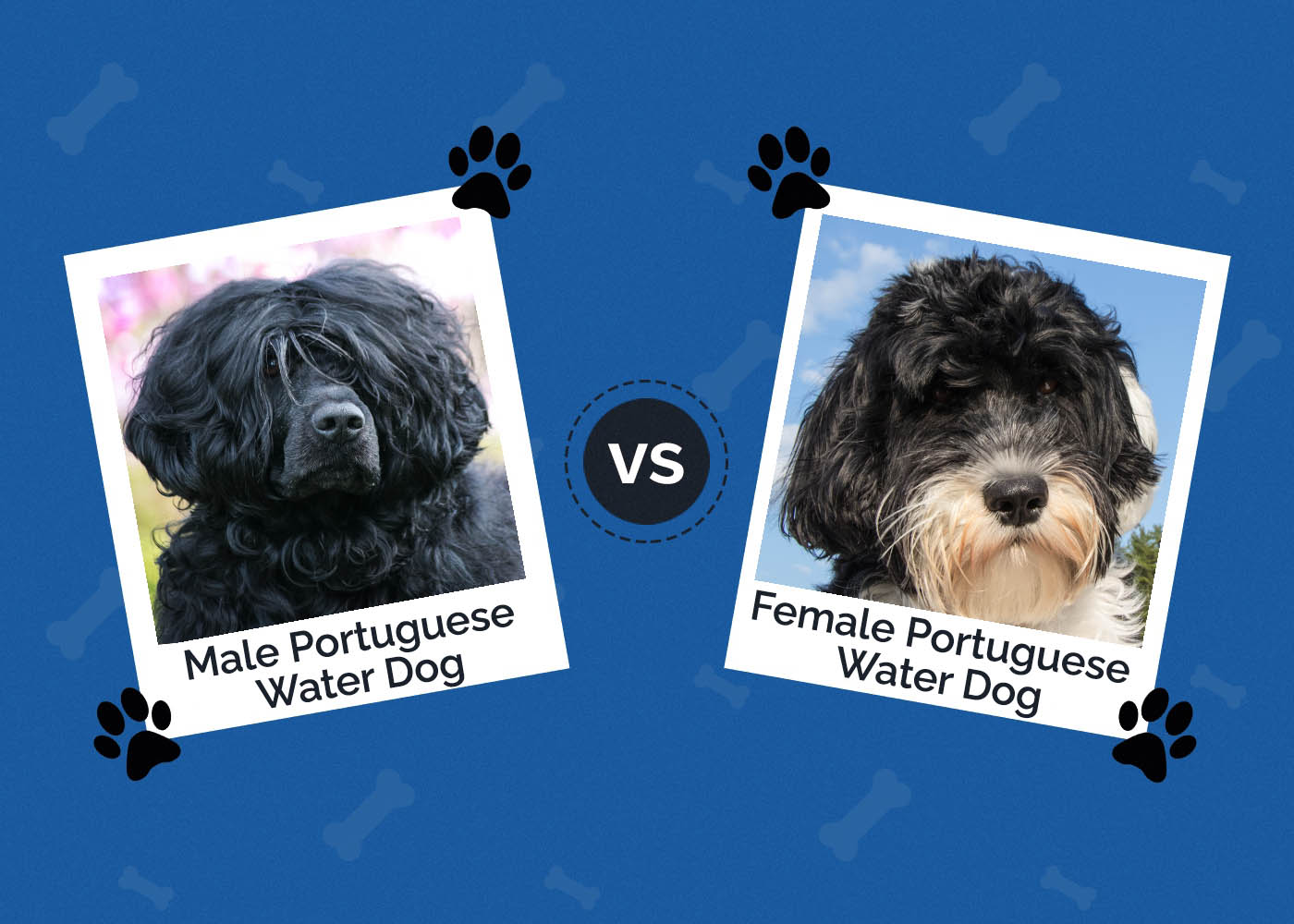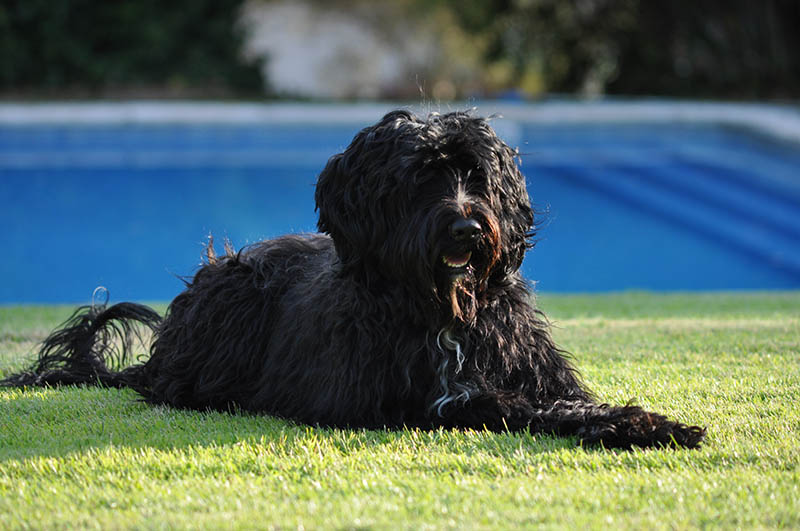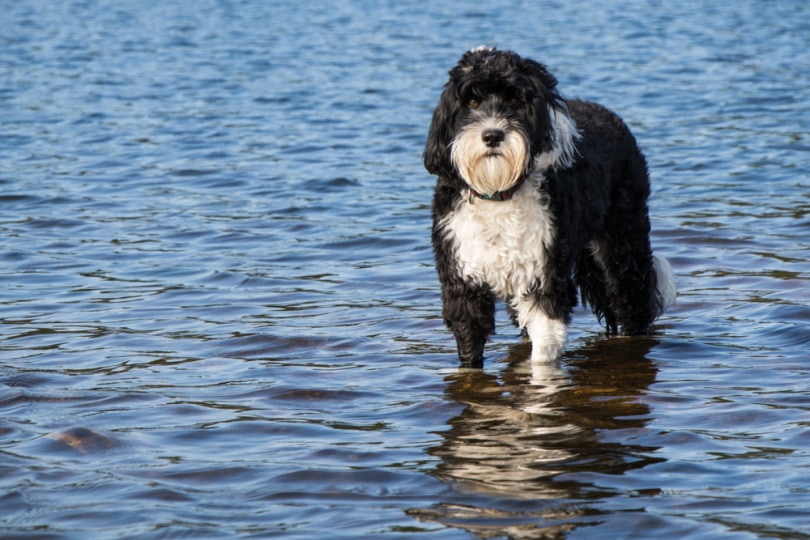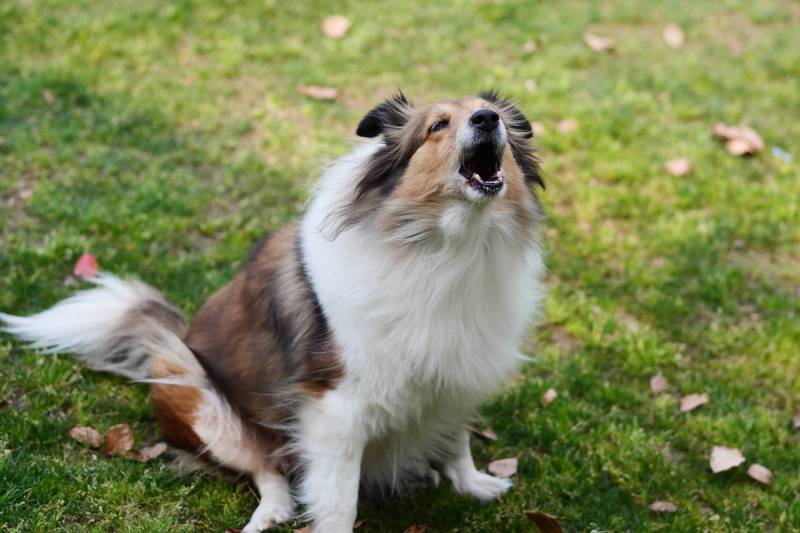Male vs Female Portuguese Water Dog: The Differences (With Pictures)

Updated on

Beyond the obvious biological dissimilarities, dogs of different genders have behavioral and physiological differences. Portuguese Water dogs are not an exception. And It’s easy to feel torn between choosing a male and a female pet.
Is it better to adopt a male Portie over a female, or is it the other way around?
Both male and female Porties are very affectionate, but girls can be more independent. While males put their undivided focus on you or the task at hand, females excel at multitasking, making them more unpredictable. Also, while males can challenge your authority directly in a few defiant actions, females can tirelessly use subtle and indirect actions to show dominance over you.
Read on to get a clearer idea of which PWD gender is ideal for you. We will only focus on fact-based differences to avoid conforming to gender-specific stereotypes.
Let’s begin!
Visual Differences

At a Glance
- Average height (adult): 20 to 23 inches
- Average weight (adult): 45 to 60 inches
- Average height (adult): 17 to 21 inches
- Average weight (adult): 35 to 50 pounds
Portuguese Water Dogs 101
Porties are a well-natured breed native to Portugal’s coastlines. Originally bred as a fisherman’s helper, the breed is intelligent and an avid swimmer. It is easy to train, and its medium size body makes it ideal for most homes, including apartment dwellings.
Like most work dogs, PWDs are playful and high-spirited. They are eager to please and thrive in busy homes where they get plenty of activities to expel pent-up energy. Although they are best known for their obedience and funny antics, they can also develop undesirable traits if they don’t receive adequate mental and physical stimulation.
Irrespective of gender, a PWDs overall character will have much to do with its upbringing. Dogs raised within a secure, social environment show the best characteristics of the breed and are mainly affectionate and loyal. With training and guidance from puppyhood, most Porties develop a warm and enchanting personality.
Male Portuguese Water Dog Overview
Male Portuguese water dogs are slightly larger than females. They have deeper chests, larger heads and weigh more because they have more muscular builds and heavier bones. By looking at male and female PWDs of the same age, you can tell their genders based on their overall size.

Personality / Character
Male Porties have pleasant, outgoing personalities. They are big at pleasing their owners and will give you their undivided attention during play and bonding sessions. While they may have the urge to get into a power struggle with you, they are more open to letting their owners be the leader of their pack. Males are typically more loyal and affectionate, making them an excellent choice for pet therapy.
The boys don’t mature as fast as females and maintain puppy-like mannerisms for longer. Once they hit puberty, they could develop a stubborn streak and throw around acts of protest to see if you can let them rule over you.
Training can resolve the problem, although you may also want to consider having your pup neutered at 18 to 24 months. Neutered males have calmer personalities and are generally easier to raise. They are also less prone to wandering and will not “mark territories” with their urine.
Training
Even with a masculine temperament, male Porties are sensitive and soft-hearted. They quickly become distrustful, apprehensive, or timid if you reprimand them. It’s in their character to be at their best when trained with lots of positive reinforcement, including praise, treats, and good belly rubs.
Male Porties mature slowly psychologically and may seem to take forever to grasp new concepts. It is necessary to be firm and consistent during training to get the most out of your sessions.

Health & Care
Portuguese water dogs are prone to a set of health concerns, although they are more breed-related than gender specific. These concerns include the following.
- Hip Dysplasia
- Adidson’s Disease
- Microphthalmia (MO)
- Juvenile Dilated Cardiomyopathy (JDCM)
- Thyroid Conditions
- Inflammatory Bowel Disease (IBD)
- Cancer
Although the above is a reasonably long list, you should not get too concerned because not all Porties endure an entire array of health problems. It is crucial to partner with your vet to stay on top of possible health concerns and treat or manage them before they get out of hand.
Moreover, have your male canine neutered for both health and behavioral benefits. Let your dog hit at least two years old because early desexing increases the risk of joint disorders in male and female PWDs.
Intact males are prone to aggressive behaviors and wandering, predisposing them to a greater risk of injury. They can also be susceptible to the following gender-specific concerns.
- Prostate infections
- Testicular cancer & tumors
Breeding
The timing of sexual maturity in dogs can vary depending on various aspects, including their pedigree. However, most male PWDs are fertile by six months but reach sexual maturity at 12 to 15 months. Some behaviors a sexually mature male may exhibit include mounting, humping, and spraying territories with urine.
Generally, males can mate at any time once they are mature. However, experts recommend waiting until they are two years old before breeding. This allows the dog to grow big enough for your vet to run crucial health tests to avoid a nasty cycle of hereditary conditions.
- Pleasant, outgoing personality
- Playful, puppy-like mannerisms for longer
- Not prone to intense power struggles
- Slower to mature psychologically
- Harder to train
Female Portuguese Water Dog Overview
Female PWDs have plenty of feminine features that make them easily distinguishable from their male counterparts. Besides being slightly shorter and less masculine, they have smaller heads, and their shoulders are not as broad.

Personality / Character
Female Portuguese water dogs are more independent and less prone to separation anxiety. While they are not aloof, they tend to multitask, a trait you could misunderstand for insubordination. Also, females are more prone to be grumpy and moody, especially if they are not winning in their ongoing struggle for dominance.
Whether spayed or intact, female Porties like to be the “queens” of their world. Fortunately, they are smart and can quickly learn to toe the line with proper training. Once you earn their trust and loyalty, they are as affectionate as males.
Training
Female Porties reach mental maturity earlier and are easier to train. Generally, they obey commands on their own terms and are not as big on people-pleasing as their male counterparts. Still, they are highly responsive to positive reinforcement and are happy to show you how well they have mastered the taught concepts.
Health & Care
The girls, like the boys, generally enjoy healthy lives, especially with regular exercise and a proper diet. Both genders are predisposed to similar genetic concerns, depending on their pedigree. It is always safer to deal with reputable breeders who do extensive health screenings to ensure they raise healthy litters.
A dog at risk of many congenital health concerns can easily snuff the joy of pet ownership. Be sure to request health and lineage information from a breeder before adoption. Also, ask for personal references and do the necessary follow-ups before taking your puppy home.
Even fairly healthy females can be prone to certain gender-specific health concerns if left intact. They include the following.
- Uterine infection (pyometra)
- Mammary tumors
- Ovarian cancers

Breeding
Female Portuguese water dogs reach sexual maturity at six months and start experiencing heat cycles. However, it is best not to breed them until the second or third heat season. If the dog is not spayed, it will undergo another heat cycle in six months.
Reaching sexual maturity doesn’t necessarily mean your dog is ready to get pregnant and raise puppies. At six months, it is still too young and is far from hitting physical maturity. It is always better to wait until it is at least 18 months old to prevent the risk of pregnancy complications.
A month before mating, take your furry friend to your vet for a detailed pre-breeding physical examination. The expert will examine its physical maturity, treat it for parasites, and do other health checks before giving you the go-ahead to breed your pet.
- Independent and less prone to separation anxiety
- Can multitask
- Easier to train
- Tend to engage in a relentless struggle for dominance
- Prone to being grumpy and moody
Male vs Female Portuguese Water Dog: Which Is Smarter?
Porties are an intelligent breed with impressive cognitive abilities. However, females mature faster and are quick to learn and improve a mastered skill, which makes training puppies easier. Behaviorists also claim that housetraining females is much easier, mainly because they can grasp concepts at an earlier age.
Moreover, females are keener and are more visually oriented. They also better understand an object’s permanence, size, and shape and can detect even minor changes in their setting. Although Porties generally don’t make great guard dogs, a female is more likely to know if something is off.
Males are mainly scent oriented and will either not notice or not be bothered by any changes. This, coupled with their inability to multitask, makes many suggest that females are smarter.
Should I Add a Male or Female Portie as a Second Dog?
Whether to add a male or female Portie will highly depend on the gender of your existing dog. If it is an intact male, consider adding a companion of the opposite sex. However, either gender can suffice if the resident Portie is a neutered male.
Keeping two intact males together can disrupt pack order and cause unwarranted rivalry and fights. The only way the two can get along is if one adopts a dominant demeanor and the other a more subtle and submissive one. Although neutered boys tend to get along better, there are rare cases where two intact males learn to get along like equals.
Two female Portuguese water dogs, whether spayed or intact, are a recipe for disaster. Living together can cause constant power struggles, each contesting for dominance over the other. Even with proper introduction and training, only a tiny percentage of females form a strong friendship bond.

Male vs. Female, Which Portie Gender Gets Along Better With Kids?
Porties are good with kids, irrespective of their gender. They have a low prey drive and are hardly ever aggressive.
Still, a female Portie is better for younger kids because it is naturally gentle, caring, and protective. On the other hand, male PWDs are rambunctious and have a thing for rough play. Their fetish for boisterous play makes them unsuitable for households with kids below seven.
Which Gender Is Right for You?
Whether to introduce a male or female Portuguese water dog to your home will highly depend on your lifestyle and preferences. There’s very limited scientific research to support that male Porties are better than females or vice versa. If anything, many differences between desexed dogs are not linked to their sexuality but are influenced by their upbringing, environment, and training.
This post is merely a cheat sheet for choosing between a male and a female Portie. Both sexes are smart, intelligent, affectionate, and form strong bonds with their families. Instead of placing major importance on gender, you may want to consider a dog’s breeding, pedigree, and lineage.
See also:
- 12 Dogs With the Best Sense of Smell According to Science
- 11 Helpful DIY Porch Potties You Can Make Today (With Pictures)
Featured Image Credit: (L) Eve Photography, Shutterstock | (R) Lynda McFaul, Shutterstock














